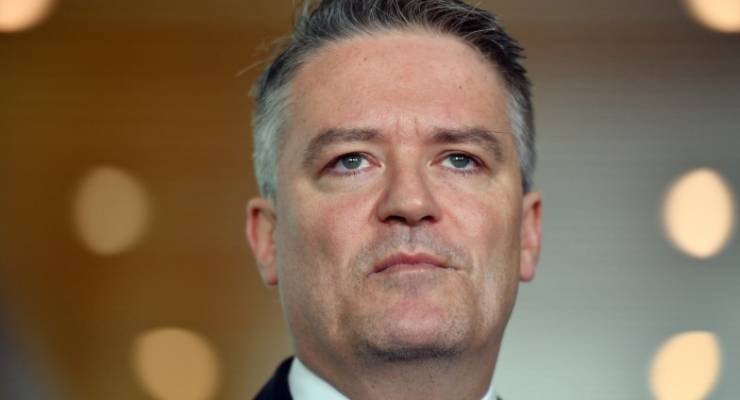
After 12 years of budget deficits, Australia will return to surplus next year. It will be a small one — just $7 billion — and the surpluses projected in subsequent years are actually lower than the government forecast just four months ago. Against that, the final deficit, this financial year, will be smaller than forecast — $4 billion, a rounding error away from balanced budget.
How did we get here? Whatever the government says, there were two key factors: Mathias Cormann and the Liberal Party’s addiction to taxation.
Cormann has carried his bat as finance minister — along with assorted other roles — all the way through this government. He blotted his copybook badly with his fumbling role in the ouster of Malcolm Turnbull last year but otherwise he has been the star performer of the government.
Finance ministers usually start off strongly and then, as budgets improve, electoral cycles come and go, and ministers become cannier at getting their way in the expenditure review committee (ERC), they lose their effectiveness.
Cormann, contrarily, has grown stronger, both because he’s been one of the few competent ministers in a generally hopeless government, and because he’s had three treasurers in just six budgets. In yesterday’s budget lock-up presser, Cormann, unusually, presided jointly with Frydenberg. At times it sounded like Cormann’s show. Something similar happened when a tentative Scott Morrison was first treasurer.
It was in partnership with Morrison that Cormann came to the fore in fiscal discipline. The Abbott-Hockey years were profligate, despite the now accepted political wisdom that the 2014 budget was some sort of monster of austerity. Government spending blew out from around 24% of GDP in the last full Labor year to over 25% and, at one stage right before Abbott was dumped, 26% of GDP — higher even than right at the very peak of Kevin Rudd’s financial crisis stimulus package.
Abbott’s fiscal indiscipline was unsustainable. Morrison was clear at the time he became treasurer, insisting the government had a spending problem. He and Cormann set to work. Spending in the 2015-16 financial year was pulled back from an alarming 26.2% of GDP under Abbott to just 25.5%. The following year, spending was restrained again, pushing it down below 25% of GDP, despite it being an election year. In 2017, the star year for fiscal discipline under this government, spending growth was confined to just over 1% in real terms. It hit 24.5% of GDP.
At the moment, the foot came off the brake — spending surged again, back to nearly 25% according to the current budget papers — the government has moved a lot of spending into this financial year, as election sweeteners — if it wasn’t for that, we’d already be in surplus. And that’s because of the other crucial factor: the Liberals love tax.
The tax story of the Labor years was one to warm the flinty heart of any libertarian anti-tax obsessive. From the 24% of GDP level under the Howard government, tax receipts (the government receives revenue from other sources as well, so tax is only most of the story, not all) fell to barely 20% of GDP. In 2008 and 2009, the tax take actually went backwards in cash terms two years running — unprecedented since the 1970s.
Even as the economy recovered from the financial crisis, tax only returned to just over 21% of GDP. The story became a familiar one: Wayne Swan would unveil one set of revenue figures at budget time, then be forced to downgrade them at MYEFO, dudded by Treasury’s poor forecasting.
Joe Hockey and Cormann initially suffered the same fate, having to unveil their own write-downs despite steely claims that lines in the sand had been drawn. But in 2017, with strong jobs growth and commodity prices beginning to lift again, the tax take began to grow — strongly. It hit 22.6% of GDP in 2017-18, and is forecast to exceed 23% this year, on its way to 23.3% next year and, after that, 23.7% — and that’s despite the government’s tax cuts.
That extra 2% of GDP in tax makes a lot of difference — it would have meant an $8 billion surplus in 2012-13, the year Labor promised a surplus and failed to deliver.
The Liberals’ dramatically rising tax take wasn’t just off the back of commodity prices and jobs growth: they have taxed Australians more intensely, according to the Reserve Bank. Moreover, they didn’t do it at a time when the economy and household incomes were going gangbusters, as in the final term of the Howard government, but at a time of slow household income growth.
“What is noteworthy,” the RBA’s assistant governor Luci Ellis observed recently, “is that for all of the past six years, growth in tax paid has exceeded income growth by an above-average margin, at a time when income growth itself has been slow… compliance efforts and technological progress in tax collection have boosted revenue collected from a given income.”
When the government says, as it said yesterday and will continue saying til election day, that the surplus is no accident, they’re right: they’ve earned that surplus through Mathias Cormann’s work and the hard labour of forcing Australians to pay more tax at a time when we’ve been struggling with sluggish income growth.








Crikey is committed to hosting lively discussions. Help us keep the conversation useful, interesting and welcoming. We aim to publish comments quickly in the interest of promoting robust conversation, but we’re a small team and we deploy filters to protect against legal risk. Occasionally your comment may be held up while we review, but we’re working as fast as we can to keep the conversation rolling.
The Crikey comment section is members-only content. Please subscribe to leave a comment.
The Crikey comment section is members-only content. Please login to leave a comment.